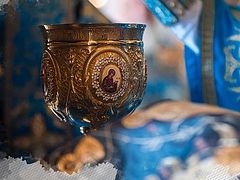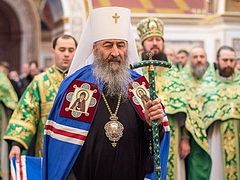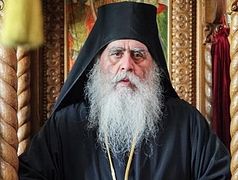On March 22, 2020, on the Third Sunday of Great Lent, the Sunday of the Cross, His Holiness Patriarch Kirill of Moscow and All Russia celebrated the Divine Liturgy of St. Basil the Great in the Church of the Right-Believing Prince Igor of Chernigov in Peredelkino, near Moscow. Following the service, the Patriarch addressed the faithful with a homily:
 Photo: Kristina Kormilitsyna / kommersant.ru
Photo: Kristina Kormilitsyna / kommersant.ru
Your Eminences and Your Graces! Dear Vladykas, fathers, brothers, and sisters!
I rejoice that the Lord has brought me to this church today, to share the Sunday prayers with you on the day that we remember the sufferings of our Lord and Savior and venerate His Lifegiving Cross. In today’s reading from the Epistle to the Hebrews (4:14-5:6), the Apostle calls us to draw near to the throne of God in order to receive mercy and find grace for timely help.
This call seems to be specifically addressed to us today. It is natural that in a difficult time, when an epidemic has begun in the country and in the world, people first of all think about their own salvation. It is inherent in human nature, and, of course, we must do everything to protect ourselves, our family, friends, and our environment from the spread of the infection.
But we know that when a common danger arises, it often destroys human ties and everyone begins to think only about himself. Sometimes this leads to the loss of our humanity, to internecine strife, to clashes, to a societal collapse. Today’s epistle reading calls us to preserve the ability to do good deeds. Despite the infection, which provokes the alienation of one person from another, we mustn’t forget our neighbors, but help them to the best of our ability—of course, following all the necessary regulations so as not to be carriers of the infection. The elderly, the lonely, and those who aren’t even able to go get food are especially in need of our support today—there are probably such people among our neighbors, family, and friends. Therefore, protecting ourselves and others from the spread of this infection, we should remember that no one has canceled the fulfillment of good deeds, and it’s not in vain that the words of the Apostle from the Epistle to the Hebrews sounded forth for all of us today.
May the Lord strengthen all of us. Let us pray for our country, for our people, and for the entire world. Unlike secular experts who have their own explanations of the causes of this nearly global epidemic, we must look at this situation through the prism of our spiritual knowledge and think: “What does all of this mean? Why does the Lord allow a plague that strikes so many people?” And the opportunity arises to think not only about the wrath of God, as happened in history, but rather about the mercy of God. The Lord calls upon our self-assured technological civilization, which believes everything is available to it and everything is possible, to assess the limits of its abilities and to realize its fragility.
Indeed, we have tremendous scientific research, and its results are being implemented in life. But the Lord as if says to us: “For all your power, you are very fragile; you are truly weak; you must rely—not only during cataclysms, but every day of your lives—on My power; on the strength that exceeds all human strength.”
Yes, we must observe all the necessary sanitary rules, in no case ignoring them, as do people who are malicious but call themselves believers, saying: “Where is our faith if we fear an infection?” One wise man, responding to this absurdity, said: “So will you go cross yourself and jump from the fifth floor? Then why do you push people, by invoking faith, to break the rules that must be followed?”
Faith should give us strength to overcome infirmities, to support our loved ones, and, despite the restrictions on movement and other restrictions being imposed on human society today, to never lose the ability to do good deeds, as today’s Epistle reading teaches us. We must remain people who are able to love and help others, and at the same time sufficiently conscious and disciplined to fulfill everything necessary to fulfill from the medical point of view, submitting to certain sanitary rules.
I want to say again: The appearance of this disease should help us understand what crisis, connected with self-confidence and pride, human civilization is in today. The Lord teaches us in different ways. He shows us today the limitations of our capabilities—not so that we would throw up our hands, not so that we would fall into confusion, not so we would lose the ability to resist, but so that we would comprehend our own fragility and the fragility of modern human civilization; and so we, continuing to labor, never losing our spiritual optimism, would nevertheless understand that God is over everything; that His Almighty right hand is over everything.
The present circumstances should strengthen us in faith even more. And those who doubt will perhaps pass through these trials and, with the right attitude towards them, from doubters will become believers. Let us hope that some of the unbelievers will see the hand of God and His mercy in these trials, and that the hearts of people that were stony yesterday will open, and that those people will become children of Abraham, as the Word of God tells us.
Therefore, we must pass through these days of trials with faith and hope in the Lord. Again, I want to say: Let us not disregard any sanitary rules and medical instructions, but at the same time let us preserve strong faith. Let these tests help us look at ourselves with a critical eye, to ask ourselves about our own lives: whether everything is correct with us, whether everything is good with us, or if we’re too accustomed to a certain well-being—at least a relative one, but still very different from former times.
May the Lord help us to remain healthy. May the Lord preserve our people, our fatherland, and the whole world in health and prosperity, and may the Lord strengthen our faith and hope in His Almighty right hand through this trial. Amen.




